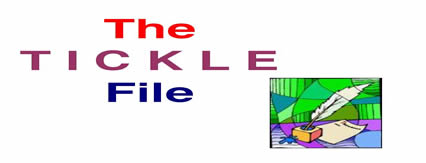
|
The Tickle File is ftm's daily column of media news, complimenting the feature articles on major media issues. Tickle File items point out media happenings, from the oh-so serious to the not-so serious, that should not escape notice...in a shorter, more informal format.
We are able to offer this new service thanks to the great response to our Media Sleuth project in which you, our readers, are contributing media information happening in your countries that have escaped the notice of the international media, or you are providing us information on covered events that others simply didn't know about. We invite more of you to become Media Sleuths. For more information click here. |
Hot topics click link for more
The electronic program guide - a list of shows available on cable and satellite platforms - is considered essential by traditional broadcasters. How else, they argue, will viewers find their favorites? On-demand TV has changed all that with smart TVs knowing what viewers want before they know they want it. Actually, the algorithms collect enough data to know what viewers like and don’t.
UK broadcast regulator OFCOM has made a pitch to the government for rules requiring on-demand platforms and such to give prominent placement on electronic program guides (EPGs) for “public service broadcasters.” That means the BBC, ITV, Channel 4 and Channel 5. Under an older rule, satellite TV providers are required to list those shows. In the oh-so-smart TV age, that’s a problem. (See more about media in the UK)
“Public service broadcasting (PSB) is now at a crucial juncture, as broadcasters face unprecedented competition from global on-demand and internet services such as Netflix, Amazon Prime Video and YouTube.,” said the OFCOM statement. “We are recommending to government that new rules are established to ensure that PSB content is clearly visible on major viewing platforms, such as smart TVs, set-top boxes and streaming sticks.” (See more about digital transition here)
The proposed new rule-making would, in theory, raise the profile of that content on platforms like Sky and Virgin Media. “British platforms like Sky already give prominence to on demand content from public service broadcasters and have long played a crucial role in helping the BBC, ITV, Channel 4 and Channel 5 fulfil their obligations to viewers, while delivering them significant reach and revenues,” said Sky chief executive Stephen van Rooyen, quoted by the Financial Times (July 4). He hopes for a different decision rather than “further regulate the already regulated.”
Trade press has an uneven reputation. The best offer crystal clear news and information. The worst shove out press releases uncritically. Publications of trade associations, a subset, slant toward the industries they serve and those working in them. A certain point of view is accepted.
The Danish Union of Journalists (Dansk Journalistforbund - DJ) represents about 15,000 Danish media workers. Among the typical union activities, it publishes the well-regarded bi-monthly Journalisten magazine. There is an online edition without paywall.
After 8 years in the editor’s post at Journalisten, Øjvind Hesselager exited last week. The DJ board directed president Lars Werge to “negotiate a voluntary resignation,” reported B.T. (June 30). “His uncompromising journalistic line wore on the relationship between the parties,” said Mr. Werge’s statement. During Mr. Hesselager’s time as editor, several reports critical of union activities were published, including pension fund investment in tax havens. He issued no statement. (See more about media in Denmark here)
Two days later, after another board meeting, Mr. Werge, on social media, announced his own resignation, effectively immediately. That board meeting, reported journalisten.dk (July 1), lasted 26 minutes. Mr. Werge said he would have no further comment.
Jakob Albrecht has been appointed temporary editor and seems to be scratching his head. "I think it's a very special situation to have a stand-in,” he said, quoted by mediawatch.dk (July 2). “We have had Øjvind Hesselager as editor for many years and he has done it very well. He had to resign after a time that seems very odd. The explanatory statement is his uncompromising journalism.” He has been assured that Journalisten “has the same independence as always.”
|


